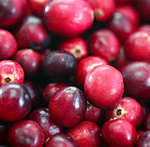Award Winning Author
Face Reading with Before & After Photos
Cranberries for Health
See Fermented Cranberry Relish
The small, dry and intensely tart cranberry is second  only to its cousin the blueberry in disease-fighting antioxidants. The remarkable anti-inflammatory properties of cranberries make them an excellent kitchen remedy for arthritic pain and infection. They quell damp conditions and so can help resolve candida, edema, cysts, lumps and tumors.
only to its cousin the blueberry in disease-fighting antioxidants. The remarkable anti-inflammatory properties of cranberries make them an excellent kitchen remedy for arthritic pain and infection. They quell damp conditions and so can help resolve candida, edema, cysts, lumps and tumors.
How do you know if you have a damp condition? If the skin above your eyelids is puffy, according to Chinese medicine it’s an indicator that your system is overly damp. To track the various facial clues that reveal your health, see Read Your Face.
Additionally, cranberries are a great food for the bladder and kidney and appear to benefit the immune and cardiovascular systems. The tannin in cranberries, proanthocyanidin, increases urine acidity and inhibits bacteria (especially E. coli) from adhering to the bladder, urinary tract and teeth. Cranberry consumption also can reduce some types of kidney stones.
Cranberries grow in a mat-forming evergreen shrub in moist woodlands and bogs throughout the cool temperate northern hemisphere. Favor organic cranberries, as the larger commercial varieties may be treated with growth hormones.
Look for cranberries that are bright red, plump, hard, and shiny. Avoid shriveled, soft, spongy or browned fruits, which may produce an off flavor. Cranberries will keep for up to two months in the refrigerator. They are at their peak in November.
To celebrate spring solstice, I once joined friends to “boil a pot of bush tea” in the deep woods near Lake Athabasca in northeastern Alberta on the Siksika (Cree Nation) Reserve. When clearing snow from the ground to build a fire, we uncovered the previous fall’s bright red cranberries. The size of peppercorns and puckery-tart, they were delicious with fresh baked bannock and fire-simmered tea.
Cranberries and their relative blueberries are the only native fruits of the far north—imagine what treasures they were to traditional peoples prior to modern transport.

